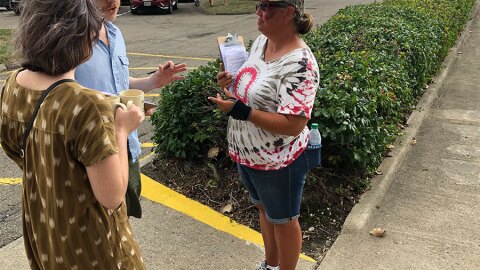Dark money gets a lot of attention at the federal level, but it’s hard at work in Ohio right now.
The controversial U.S. Supreme Court decision Citizens United v. FEC almost a decade ago helped bring in hundreds of millions of dollars into political campaigns – and the groups that benefit don’t have to disclose where their funds came from.
The proposal to overturn the state’s new nuclear power plant bailout isn’t even on the 2020 ballot yet, but the group behind the referendum effort has already launched its first ad.
“If someone approaches you with a petition to allow you to vote on corporate bailouts, sign it,” the ad copy reads.
This comes in response to a pro-bailout campaign working to stop the potential ballot issue. It’s estimated to have spent $3.5 million on its own petition supporting the bailout, along with mailers featuring vivid images invoking the Chinese flag. One of their ads including the line: “They’re bringing in outsiders into our state to roam our neighborhoods with petitions, and they’re asking for your personal information.”
Bradley Smith, a professor at Capital University Law School and a former chair of the Federal Elections Commission, says he’s fascinated by the campaigns.
“To me, what's really interesting is that they're doing this all this just to keep the petition from even qualifying for the ballot and that's what I don't recall saying before,” Smith said. “Is somebody coming forward and trying to spending a large amount of money just to get the issue from even being placed on the ballot.”
https://www.youtube.com/watch?v=LS21FoULrXE&feature=youtu.be
Smith uses that word “somebody” because nobody knows exactly who is behind Ohioans For Energy Security, which circulated those commercials and fliers. Spokesman Carlo LoParo says that’s the way it will stay.
“It's not that we won't disclose our donors,” LoParo says. “It's that we're following the law, and the law allows us free speech. And we're exercising that free speech right.”
To be fair, the group trying to overturn the bailout law, Ohioans Against Corporate Bailouts, is also not revealing its donors. But the law requires that group, as a ballot issue PAC, to file financial disclosure forms within 30 days of filing its petitions – which will happen on October 21.
Ohioans Against Corporate Bailouts spokesman Gene Pierce said his group is made up of the same people who opposed the bailout law when it was House Bill 6.
“You're talking about consumer groups, business groups, renewable energy advocates and people who want to offer more competitive pricing and the electricity marketplace in Ohio,” Pierce says.
LoParo claims that group also includes natural gas companies, and that a Chinese government-owned bank invested in those companies.
https://www.youtube.com/watch?v=Pi9SmcK98Y8
Pierce says it’s ridiculous to tie the referendum group to the Chinese. He pointed to FirstEnergy Solutions, the owner of the state’s two nuclear power plants, and its former parent company FirstEnergy as likely donors to the bailout opposition.
There is little known about that opposition. Ohioans For Energy Security is a limited liability corporation, and there’s little information in its filing with the Secretary of State’s office.
LoParo himself is a longtime PR figure in the Ohio Statehouse, having worked for, among others, Republican former Secretary of State and governor candidate Ken Blackwell – who also employed Gene Pierce. LoParo also spoke for the Ohio Clean Energy Jobs Alliance, which advocated for passing the bailout law, along with Generation Now, another dark money group.
Generation Now is sending “monitors” to share the pro-bailout side with people being asked to sign the referendum petitions. There have already been clashes between petition circulators and monitors.
Groups including the League of Women Voters and Common Cause Ohio have called for more financial disclosure of the groups involved in this referendum. Ohio State University Moritz College of Law professor Dan Tokaji said it’s simple.
“It's fundamentally an issue of transparency,” Tokaji says. “We should know we the people should know who's funding campaigns whether they're for ballot measures or for candidates.”

Critics say that corporate and high profile donors sometimes want to be shielded to avoid protests and boycotts, and that they support dark money groups for reasons beyond political activity. Smith said there’s often plenty of information about dark money groups anyway.
“I think anybody would be it would not be shocked to discover that there's a fair amount of energy company money behind this, the people who in fact would benefit from this directly. So I know how much voters would benefit,” said Smith.
Smith is the founder of the Institute for Free Speech, which opposes campaign finance reform. It’s a 501(c)3 organization – those are religious, charitable, scientific or educational groups – and doesn’t have to disclose its donors.
But on its website, Institute For Free speech does provide IRS forms required for nonprofit organizations. So do the League of Women Voters and Common Cause Ohio, which are 501(c)4 or social welfare organizations that are calling for more disclosure.




